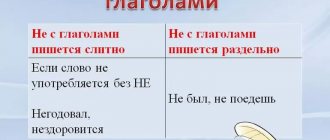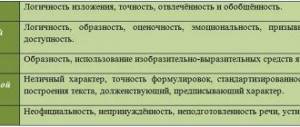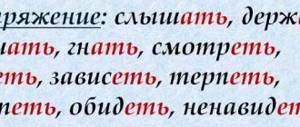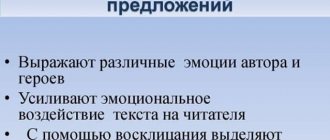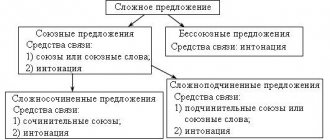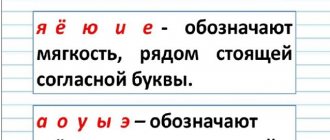General rule
Children learn the general rule of writing “not” with verbs in the 3rd grade; it does not present any difficulty. According to this rule, “not” is written separately with verbs, except in cases where the word is not used without “not”.
Let's look at examples:
- did not come;
- didn't say;
- you won't notice;
- hates (not used without “not”);
- is perplexed (not used without “not”).
It must be remembered that the word “wasn’t” is also a verb, so it is written separately.
Russian language lesson in 3rd grade. Topic: SPELLING PARTICLES NOT WITH VERBS
Writing the topic on the board
.
– What questions do you have? (What is not
?
What part of speech does it belong to? When is this word used in speech? How to spell without
verbs? )
(The teacher writes down the children’s questions on the board)
III . Discovery of new knowledge
1. Observation of the use of the particle
is not .
Ex. 360
.
- Read the sentences. What is the difference between them?
– Why did the meaning of the sentence change?
Writing on the board
:
Read - didn't read
Love does not love
– Look at how verbs are written with no
. What will be the meaning of the written pairs of words? (The opposite.)
– What gives negative meaning? (The word is not .
)
2.Reading the rules in the textbook frame on p. 112.
Questions after reading
.
– What is the name of the new word ?
? (Particle, negative particle.)
- It's part of speech. What other parts of speech do you know?
– Which group of parts of speech can it be classified as independent or auxiliary? Why? (It is not used independently in speech; it is impossible to understand that it is not .
)
– What role does it play in speech? (The particle does not give a negative meaning to the word or the entire sentence.)
– How to spell the particle not
with verbs? How is the spelling indicated?
3.Teacher's story. Creative task
– Verbs cannot tolerate the particle not
. She is so small, but she “crosses out” what the verbs say. She denies everything. Therefore, the verbs pushed her away.
– Try to illustrate these “relationships.”
4.Work in groups
Students complete the assignment and present the group's work.
— What are we going to evaluate? Write on the card why you are giving your token to this group (interesting idea, well done, clearly and clearly explained, etc.)
Evaluate the work of the groups.
5.Working with an illustration at the beginning of a paragraph
(p. 112).
- What is Afanasy doing? (Shows that the particle is not
must be written separately.)
– How do you write this phrase? Why? Write it down in your notebook. ( Do not forget!
)
- This is the law for you.
IV . Primary consolidation.
Work in the textbook.
1. Ex.
361 – the ability to find verbs with the particle not and determine their role
.
a) Children explain the meaning of proverbs where necessary
.
– Find the verbs. How is the particle written ?
with a verb?
– What value does the particle make ?
?
b) Recording proverbs according to options
.
Option I
: first 3 proverbs;
Option II
: The following 3 proverbs.
2. Ex.
362 – speech skills develop (correctly use proverbs in speech), as well as spelling skills – write without verbs.
Complicated copying with the designation of spellings.
-Rate yourself using the rating scale.
We agree that we will evaluate, for example, the correctness of execution.
Next is mutual verification. The guys change places (trickle technique: those who were sitting on the first desk go to the last desk, everyone else moves forward
).
On the same rating scale a mark is given according to the same criterion.
Difficult uses of "not"
Despite the obvious ease of the rule, sometimes problems arise.
As already mentioned, as an exception, “not” with verbs can be written together if the word is not used without “not”.
Sometimes schoolchildren mistake another part of speech for a verb (for example, a participle) and write separately (for example, “an uncurtained window”). Therefore, before deciding whether to write “not” together or separately, you must take the time to determine the part of speech.
There may also be a problem with the spelling of the particle. With verbs, not only the particle “not” can occur, but also “neither”, as well as the conjunction “neither... nor....” (“I couldn’t run or jump,” etc.) However, both the particle and the conjunction are also written separately with verbs.
Spelling particles not with verbs
-Guys, to check in what sense the particle “not” is used, let’s work with proverbs. In total, you have four proverbs on your desks, but they have fallen apart. Working in pairs, collect them.Work with proverbs in pairs:
Who doesn't work
| not friendly. | |
| With lies is truth | and fish from the pond. |
| You can't pull it out without difficulty | doesn't. |
| Laziness of goodness | he doesn't eat. |
-Let's check how you collected the proverbs. Look at the slide.
Examination.
—
How do you understand these proverbs? Give examples from life to which these proverbs would apply. He who does not work does not eat. Truth is not friendly with lies. Laziness does no good. You can’t even pull a fish out of a pond without difficulty.
-Let's see in what meaning the particle not is used here? (in the negative)
-Let's read the “Pay attention” section to find out if we correctly determined the meaning of the particle not. - Guys, look carefully, in a negative sense, how will we write the particle NOT with verbs? (Apart)
-Open your notebooks, write down the number, great job.
- To find out how to write particles not with verbs, let's read the poem on page 124.
-Read it to yourself. Vanya, read it out loud.
-Who is this poem about? (about a friend)
-What kind of friend is described? Read its description.
-Would you like to have such a friend?
-Think about whether you are a good friend.
-Let's find in this poem all the verbs with the particle not.
-Write down the verbs with the particle NOT in your notebook. Vanya is working at the board. Students come up to the board to write in a chain, with comments. Examination. -What verbs did you write down?
-Guys, conclude how to write the particle NOT with verbs? (Separately) - Let's compare our answers with the rule in the textbook.
-What new rule about spelling verbs did you learn? - Let's conclude in chorus how verbs with the particle NOT are written? Choral speaking.
-Did we find out how to write a particle not with verbs?
-Guys, not all verbs are written separately from not.
In order to find out which ones, I suggest you listen to a fairy tale called the power of love. I will read it to you, and you try to highlight all the verbs used with the particle not. (students have the text of the fairy tale on their desk, highlight the verbs with a pen)
Fairy tale. THE POWER OF LOVE A proud and stubborn particle of Not
loved the noble Verb.
This love was difficult and sad. I didn’t
constantly contradict the Verb.
He said: “I love you,” and she said: “I don’t love you.” He admitted: “I believe,” and she admitted, “I don’t believe.” The particle Ne
never came close to the Verb and was written only separately from it.
However, Verb was constant in his feelings. So one day Ne tells him: “I will reciprocate your feelings if you prove that you cannot live without me.” The Verb sighed sadly and went to wander through dictionaries and textbooks. When he returned to his beloved, she, as usual, jumped away from him shouting: “I’m indignant!”, “I hate it!” And suddenly she froze in surprise: this time the Verb remained next to her. So he proved that in some cases he really couldn’t live without her. —
What verbs with NOT do you remember? (I don’t like, I don’t believe, I didn’t approach, I can’t, I hate, I’m indignant).
-What did you notice? (That the verbs to hate and resent are written together.) - Guys, how is NOT written in these verbs? (Children's assumptions.) - Why? Can you guess? (They don’t make sense without NOT.) - Let’s remove the NOT and try to read. - I say this, am I “annoying” you? Or “I see”? (No.) - I’m telling you: I love, appreciate, respect you. -The verbs to hate, to indignate are exception words, and the words to captivate and to be perplexed are also exception words. -You need to remember them! Write down these words.
Prefix "under-"
In the Russian language there is a prefix “nedo”, which is very easy to confuse with the combination of the particle “ne” and the prefix “do”.
Let's compare the offers:
- The patient lacked air.
- The bedspread did not reach the floor.
In the first case, we see the prefix “under-” in the word; in the second - the particle “not” and the prefix “do-” (“not” is written separately).
How to distinguish these cases?
To distinguish the prefix “under-”, you need to try to remove “not” from the sentence. If the meaning of the sentence changes to the opposite, then we have the particle “not” and a verb with the prefix “do-”. If the sentence loses its meaning, then we are dealing with a verb with the prefix “under-”.
Here are some examples:
- The child often did not finish the salad. Let’s take out the “no” and get: the child often finished the salad. The meaning of the sentence has changed to the opposite, therefore “not” is a particle, it must be written separately.
- During these difficult times, many were malnourished. Let’s throw out the “no” and we get: in these difficult times, many people finished eating. The result is nonsense, which means we have a verb with the prefix “under-” written together.
- We didn't watch the performance to the end. Let's throw out the “not” and we get: we watched the play to the end, the meaning has changed to the opposite, which means “not” is written separately.
- They didn't look after the baby. Let’s throw out “no” and get “looked after the baby.” This is nonsense, so you have to write it together.
The prefix “under-” can also indicate insufficient action. To make sure that the verb really has this prefix, you need to try to find an antonym with the prefix “re-”. If it works, we’ll write together. To underfulfill the plan is to overfulfill the plan; to underestimate the enemy is to overestimate the enemy.
There is a verb “to be unwell”, which is written together with “ne”, because there is no word “to get well”, but it is necessary to distinguish from it the verb “to be unwell”, which is written separately.
Download material
so UNT / Lesson developments / Russian language lessons
Russian language 3rd grade. Topic: Particle NOT with verbs
10/13/2014 5170 752 Golikova Ekaterina Viktorovna Lesson objectives. • expand children's knowledge about the functional parts of speech, deepen students' knowledge about the verb as a part of speech (lexical meaning of the verb, positive and negative meaning of verbs), introduce the role of the particle not and its separate spelling with verbs. • fostering a culture of educational work, creating a creative and favorable microclimate in the team. • develop the ability to use and correctly write not with verbs, develop the skills of accurately using verbs in speech Lesson objectives: • expand children’s knowledge about the functional parts of speech • introduce the role of the particle not and its separate writing with verbs • develop the skill of correctly writing particles not with verbs algorithm based; • develop children's communication skills; • fostering a culture of educational work Lesson type: mastering new knowledge Equipment: textbook “Russian language, grade 3, part 2”, multimedia projector, computer, cards, presentation.
During the classes
1. Organization of the beginning of the lesson. Checking students' readiness for the lesson, preparing notebooks. We open the notebooks, write down the number, great job. A minute of penmanship. (slide 2) Vocabulary work. North, lilac, soldier, straw, thank you, Saturday, happiness. Sound warm-up. 2. Updating knowledge. Collective correction of errors and explanation of spelling rules. Brainstorm. Practical work on the card (put verbs in the past tense, singular h.r.) Rect.mit, r.sh.t, p.k.rmit, ob..snit, sk.lzit, z.v.zat, next next, see third (slide 3).
3. Setting goals. — Spelling not with verbs — Learn to write correctly, not with verbs Teacher — Do you think the particle NOT is an auxiliary or an independent part of speech? (Official) Teacher - Why do you think so? What do you know about functional parts of speech? Children - Functional parts of speech do not name objects, signs, or actions. They are not members of the sentence. You can't ask them a question. Teacher - How do you spell the particle NOT with verbs? -Perhaps, based on experience and practice, someone knows how to write NOT with a verb? (Does NOT need to be written separately) Teacher - The particle does NOT negate the verb. - Guys, I prepared proverbs for your lesson today, please read them. (slide 3) A person’s lies are beautiful. Put off a good deed until tomorrow. Make new friends and forget old ones. A friend will leave you in trouble. -Do you like them? -Why do these proverbs sound meaningless? -What should be added? (You need to add the word NOT). -This little word is NOT called a particle. -What part of speech is preceded by NOT? (before the verb). -Write down the verbs with not? 4. Primary consolidation. 1.Work with proverbs. Teacher. See how to read these proverbs and write them down correctly. It starts with one proverb and ends with another. Help! Make up proverbs and explain their meaning. (slide 6) Who (not) works (not) sit on the stove. There are rolls - hurry up. (Don’t) rush your tongue, he (doesn’t) eat. Teacher - Write down the proverbs, opening the brackets. Teacher - Read the verbs with the particle NOT. Teacher - How did you write these words, why? 5. Application of knowledge and skills in practice (slide 8-9) ___ learned - __ do, ___ know - __ hurry, With verbs ___________ Write particle ____.
6. Introduction to exception verbs. In the Russian language there are verbs that are written together with the particle NOT - these verbs are called exceptions, and they need to be remembered. Read these verbs. (slide 10) to be unwell, to hate, to be indignant, to be perplexed. dislike Let's explain their meaning. To be indignant - to be indignant, to be dissatisfied. To be perplexed - synonyms - to be confused, not to understand, to be at a loss, to be at a loss. In what actions does a person show bewilderment - scratching the back of his head, shrugging his shoulders, widening his eyes Hate - feel hostility and disgust Sick - experience a painful state Unhealthy - be sick, get sick - Try to guess why in these words the particle is not written together with the verbs? -Without NOT these verbs are not used. Here it is NOT part of the root. – Write down these verbs - exceptions, you need to remember them. Children write down exception verbs in their notebooks. In fact, there are many exception words in the Russian language (to dislike, to dislike, to dislike, to be perplexed), but you will become familiar with them in high school.
7. Incorporating new knowledge into the knowledge system Test “NOT with verbs”. - And now a little test to test your knowledge. 1) Particle NOT is ……………. Part of speech. auxiliary or independent 2) The particle does NOT give meaning to the verb……. Negations or affirmations 3) Which word is written incorrectly? I won’t forget to draw if I’m unwell
8. Independent work p. 98 ex. 228 9. Lesson summary. — What new did you learn in class today? — Was anything unclear?
10. Homework p. 98 rule, p. 99 exercise. 229
See the downloadable file for the full text of the material.
The page contains only a fragment of the material.
§27. Spelling particles not with verbs - textbook by Buneeva Pronina, grade 3, part 2
360.Read the sentences. What do they have in common? What is the difference? Why did the meaning of the sentences change?
The sentences are united by the fact that they tell about children who read something or, conversely, do not read. The sentences are distinguished by a positive attitude towards reading in the first and second cases and a negative attitude towards the book and poetry in the third and fourth sentences. The meaning of sentences changes when the particle not is used. A particle not with verbs is written separately, it is an orthogram - a space, and introduces an element of negation into any statement.
361. Read the proverbs, explain their meaning. What role do verbs with the particle not play in them? Write it down, indicate the spelling - space.
If you are afraid of wolves, do not go into the forest. (In any business there is a certain risk, but it’s worth taking the risk to achieve your goal.)
Don't say what you don't know. (You can’t say something that you don’t understand or understand anything about.)
Don't look for beauty, look for goodness. (do not get carried away by the external side of the matter or the external merits of a person, but try to comprehend the inner content, the inner beauty of a phenomenon or personality.)
Murder will out. (everything secret inevitably becomes known to everyone sooner or later.)
Having a friend means not feeling sorry for yourself. (if you want to have a true friend, you yourself must be ready to sacrifice a lot for him.)
You can’t put a scarf on every mouth. (you can’t do anything if people speak badly about someone or you, even if it is not true and discredits someone’s honor.)
362. Explain the meaning of proverbs. Write it down. Indicate the spelling - space.
Steam doesn't break bones. (it’s better to dress warmly than to freeze in a light dress from the cold.)
You can't spoil porridge with oil. (try to do everything to the maximum, you can’t have too much of a good thing.)
The truth does not burn in fire and does not drown in water. (It is always better to tell and hear the truth; the truth is most precious to everyone.)
Don't have a hundred rubles, but have a hundred friends. (money can’t always solve a problem, but true, true friends will definitely come to the rescue, and if there are a lot of them, then the solution will be simple and easy.)
363. Write down, open the brackets, insert the missing letters. Label the spellings.
What parts of speech are there in this text? Name these parts of speech.
364. Writing from memory. Read the tongue twister. Find and underline with a simple pencil all the spellings in words and between words. How many spellings are there in total?
Close your textbook and write from memory. Label the spellings. Check what you wrote in the textbook.
In total, there are three types of spelling patterns in the tongue twister: a space, a preposition with a noun, and a paired consonant at the end of a word.
Don't blow your lips on the oak tree. Don't blow your lips on the oak tree.
365. Dictation with preparation. Read it. Find and underline all the familiar spellings. Explain the spellings. Close your textbook. Write from dictation. Label the spellings.
Check what you wrote in the textbook. Write above each word what part of speech it is.
366. Dictation with preparation. Read an excerpt from A. Maikov’s “lullaby”. Underline and explain the spellings in the second stanza. Record the second stanza from dictation.
Label the spellings.
Check what you wrote. Underline the verbs with two lines. Indicate their time and date.
“I did not drive (pro. Vr., singular) the waves of the sea, I did not touch the (past Vr., singular) golden stars. I protected the child (past. Vr., singular) I rocked the cradle (pro. Vr., singular)
note : here the verbs are underlined with one line.
367. Free dictation.
Spelling particles NOT with verbs 3rd grade presentation for a lesson in the Russian language (3rd grade) on the topic
Slide 1
Russian language lesson 3rd grade for the textbook N.V. Nechaeva Primary school teacher, Municipal Educational Institution “Secondary School No. 41” Zaraeva I.I.
Slide 2
Well, check it out, buddy, are you ready to start the lesson? Is everything in place, is everything in order, Pen, book and notebook? Is everyone sitting correctly? Is everyone watching carefully?
Slide 3
VERB “The verb is the most fire-breathing, most living part of speech. The scarlet, freshest blood of the language flows in the verb.” A. Yugov
Slide 4
THEORETICAL WARM-UP
Slide 5
What is a verb? This is a part of speech that denotes the action of an object and answers the questions: what to do? what is he doing? what will it do? what did you do?
Slide 6
What is the meaning of a verb in speech? Verbs make our speech come alive
Slide 7
What role does the verb play in a sentence? The verb in the sentence is a predicate
Slide 8
What is the infinitive form of a verb? Verbs that answer the questions what to do? what to do? are infinitive verbs
Slide 9
I write beautifully, cleanly, neatly, competently; I write the beginning of a sentence with a capital letter, at the end of the sentence I put a punctuation mark; 3. I transfer from one line to another syllable by syllable; 4. I remember the red line; 5. I write, reciting to myself syllable by syllable the 5 “golden” rules of the Russian language
Slide 10
read cherish be friends burn A minute of penmanship
Slide 11
Parts of speech Independent: Functional: noun noun adjective verb pronoun adverb numeral conjunction preposition particle
Slide 12
Parts of speech Independent: Which part of speech is NOT? Service:
Slide 13
Lesson topic: SPELLING PARTICLES NOT WITH VERBS.
Slide 14
Mobilizing stage (You don’t) talk, (don’t) lie, (don’t) write, (don’t) talk, (don’t) hate. What do these words have in common? How do we write the particle not? Which word is "superfluous"?
Slide 15
A minute of penmanship (You don’t) steal, (don’t) lie, (don’t) write, (don’t) fuck, (don’t) hate. Look, eat, look...
Slide 16
Vocabulary and spelling work Learn good things, so bad things will (not) come to mind. A lazy person is always (un)well. Find verbs that are used without the particle not. What verb is not used without the particle not.
Slide 18
Read, remember (Didn’t) meet the guest (Didn’t) finish the word (Didn’t) remove n-tno (Didn’t) tie up the horse— (Didn’t) save the group- (Didn’t) make a wish (Didn’t) recognize the area (Didn’t) strengthen the forest- prostrate
Slide 19
Remember and write the phrase did not meet the guest did not finish the word did not delete the word did not tie the horse - did not save the gru - did not make a wish did not recognize the location did not strengthen the staircase
Slide 20
Write sentences based on the diagrams. Insert the required letters. Open parenthesis. A strong friend (not) sl(o, a) toils. The heron (not) moves. Dru(k,g)( )in b(i,e)de (will not) leave. (Not) swaying in (o,a)yes (in)oz(i,e)re. Scheme:
Slide 21
Fairy tale. I do not like. I do not believe. Didn't fit Can't I'm indignant! I hate it!
Slide 22
Do not hate - Do not resent - hate someone, something. to experience, to show a feeling of indignation. From Ozhegov’s dictionary: EXCEPTION WORDS
Slide 23
Work in pairs
Slide 24
PROVERBS: He who does not work is not a friend. With lies, truth and fish out of the pond. You can’t pull it out without difficulty, it doesn’t do it. Laziness does not eat good things. he doesn't eat. not friendly. and fish from the pond. doesn't. NOT with 3 verbs
Slide 25
Doesn't bark, doesn't bite, and doesn't let him into the house. From which ladle do they not drink or eat, but only look into it? I wake everyone up on time, even though I don’t wind the clock. There was a child - he did not know diapers, he became an old man - a hundred diapers on him. Who has never taken a step?
Slide 26
Insert the particle NOT into the text. Take care of the book! ...take it with dirty hands and ... put it on a dirty table. ... bend the book and ... bend its leaves. If you... took a book from the library, then... forget to return it on time. No no no no
Slide 27
Reflection - It was difficult for me... - I doubted... - I liked it... - I am satisfied...
Slide 28
“Remember, my friends, the magic particle NOT, by denying a bad, unworthy action, teaches us a wise attitude towards life and ourselves.”
